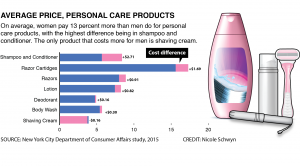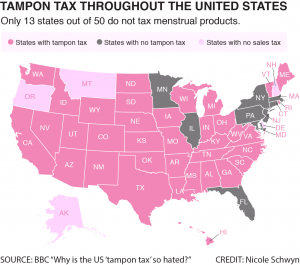‘Pink’ taxes burden women on tight budgets
By Nicole Schwyn
Gulliver Preparatory School
Menstruation is part of a woman’s life, and the products that she would use (i.e. tampons and/or pads) to handle her period are a necessity.
Until the Florida legislature passed the tampon tax repeal in 2017, Florida women were burdened by a stealthy tampon tax which made the necessary seem extravagant. It classified feminine products as a luxury, subjecting them to taxes not placed on basic items such as food.
“The exemption of the tampon tax occurred because women from all over, not just my constituents, began to send me emails about the need for this exemption,” said Rep. Katie Edwards-Walpole, a co-sponsor of the tampon tax repeal.
“Several people even received emails with the subject being ‘periods are not a luxury,’ so people who did not know what that meant would open it up and then realize … that menstrual products, like similar products such as diapers, are not a luxury, they are a necessity.”
A 2015 Consumer Affairs study on gender pricing also affirmed the existence of a “pink tax.” Their analysis of five industries (toys and accessories, children’s clothing, adult clothing, personal care products, and senior/home health care products) found that overall women paid seven percent more for these products than men. With personal care items, women paid 13 percent more than men. The tampon tax repeal has helped diminish the gender inequity for Florida women, but the pink tax remains.
This “tax” creates hard times for women on a tight budget. Lower-income women have adapted to their situations and have used products such as towels or toilet paper to replace products they cannot afford. While some women might use medications to control their periods, these women might not see them as something that is needed.
Working women who would buy feminine products get no support from federal programs. The Supplemental Nutrition Assistance Program (SNAP) and Woman, Infants, and Children (WIC) programs do not cover menstrual products because they define those items as “luxury” products.
According to a Time article, “America’s Very Real Menstrual Crisis,” many women have reached the point of trading or selling food stamps for tampons. Some receive these products through nonprofit organizations that create menstrual hygiene kits.
College women, on the other hand, might not be able to receive menstrual products for free if they are not provided by their university. They would, however, have access to birth control, and might consider that to be a necessity if they are buying cheaper versions or have an insurance plan that covers much of the cost.
“I am taking birth control and it is completely covered by my parents’ plan, even though I have a plan with UM,” said a 20-year-old junior at the University of Miami who asked to remain anonymous. “While my birth control happens to be free, I do not know if the insurance at UM covers it.”
According to Bizfluent, a college student’s income can range from $7,000 to $42,000 a year. The Department of Numbers, a website that catalogues data on social, economic and financial data, lists the average income in Miami at $51,362. If these college students have to also pay tuition, rent, and other bills then they might not have enough money to pay for birth control or menstrual products, even the cheapest options available.

“One of the more cheaper pills that I prescribe is $90 a month,” said gynecologist Michelle Starke. “However I have heard that Planned Parenthood provides even cheaper birth control pills, around $10-$20 a month.”
Until the price of menstrual products and medicines, like birth control, go down, women who are on limited budgets will not be able to access the products when needed.
“Getting off birth control should not directly affect the health of a patient, but could indirectly affect her health. As her periods could be heavy and it could lead to anemia,” Starke said.
“It is not stopping the pill that causes problems, it is just that the pill usually masks problems and when you stop the pill you unmask the problems.”
